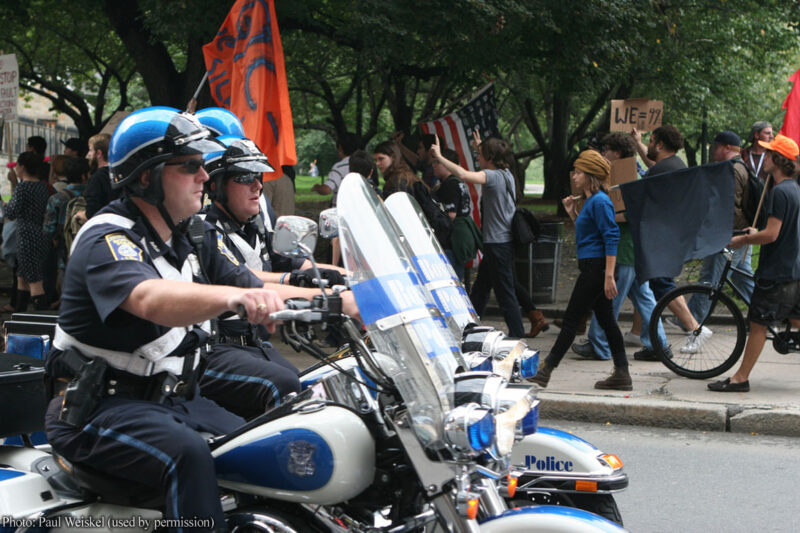Why Are DC Police Keeping Their Body Cameras Off During Inauguration and the Women’s March?


A lot of social media activity has come to our attention questioning why the DC police have been instructed NOT to turn their body cameras on during the president’s inauguration and the following day’s “Million Women March.” Many people seem puzzled by this.
“ACLU Demands That Body Cams Are Turned Off During Inauguration While They Intend To Record Police” proclaims the headline of one widely circulated , on a site called “Law Officer” (and seemingly based upon this ).
It’s not an ACLU “demand,” it’s actually DC law. True, the supported and encouraged adoption of that law, but the wider District of Columbia community as represented by its city council agreed with us. And is not absolute; in its full form it says that:
MPD officers may record First Amendment assemblies for the purpose of documenting violations of law and police actions, as an aid to future coordination and deployment of law enforcement units, and for training purposes; provided, that recording First Amendment assemblies shall not be conducted for the purpose of identifying and recording the presence of individual participants who are not engaged in unlawful conduct.
We supported that law for very good reasons. There is a long history of law enforcement compiling dossiers on peaceful activists exercising their First Amendment rights in public marches and protests, and using cameras to send an intimidating message to such protesters: “we are WATCHING YOU and will REMEMBER your presence at this event.” For a vivid picture of how photography can create chilling effects, recall the civil rights march from Selma to Montgomery Alabama in 1965, when Alabama state troopers viciously attacked and beat peaceful protesters. Then take a look at this ominous photograph, which after thousands of federal troops were finally sent to protect the marchers:

Trooper filming Selma march, 1965. Photo by Alfred M. Loeb; used by permission.
There’s also a long history of such information being used in abusive ways against Americans peacefully agitating for a better society.
The purpose of body cameras is to serve as a check and balance on the enormous power that society confers on police officers, including the power to use brutal or even deadly force in some circumstances—a power that we all now know has unfortunately been abused all too often. The purpose of body cameras is NOT to serve as an intelligence gathering tool helping police collect information on people exercising their rights. Even if intel gathering were not the intent at the time that video was collected, there would remain the possibility that police at some later date would be tempted to run face recognition on that footage, or use it for other, nebulous “intelligence” purposes (a word that in the police context is directly connected to a of surveillance and other abuses). There are serious concerns in many communities that, instead of being a tool for much-needed oversight over police officers, body cameras will become just another surveillance device.
Such concerns are why the ACLU recommends (including in our model legislation) that police department adopt a policy against the taking of video of people who are merely exercising their First Amendment rights.
Of course, none of this means that the police cannot turn on their cameras during the inauguration or march if something goes down. The of the DC police, like most, stipulates that officers are to turn their cameras when engaged in “police actions” such as calls for service, pursuits, searches, stops, etc. Thus, if a fight breaks out, or some larger disturbance, the cameras would go on.
Many of the articles and posts covering this issue point out that the ACLU also supports and encourages the filming of police by citizens through our Mobile Justice app, including the —and suggest this is a contradiction. A typical , for example, says, “This one seems a bit hypocritical to us. The ACLU... are pushing a mobile app encouraging people to record the police... while not wanting to be recorded themselves.”
But this isn’t hypocritical at all. As we’ve said many times, there is no reason for the government to be filming or otherwise monitoring its citizens absent suspicion of wrongdoing—but it absolutely is the people’s right to monitor their government, including police officers, and how they are doing their jobs. Citizens should be watching their government—but not vice-versa.


